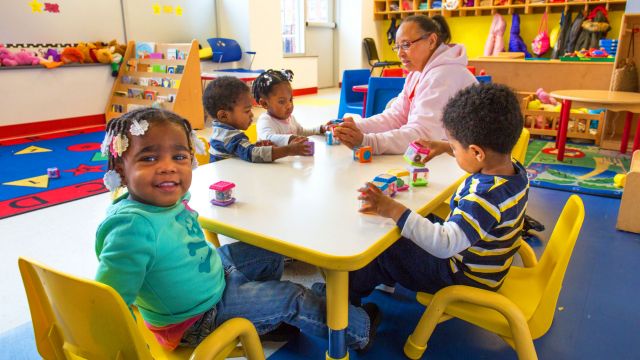Prioritizing Play and Learning for People, Programs, and Policies
Prioritizing Play and Learning for People, Programs, and Policies
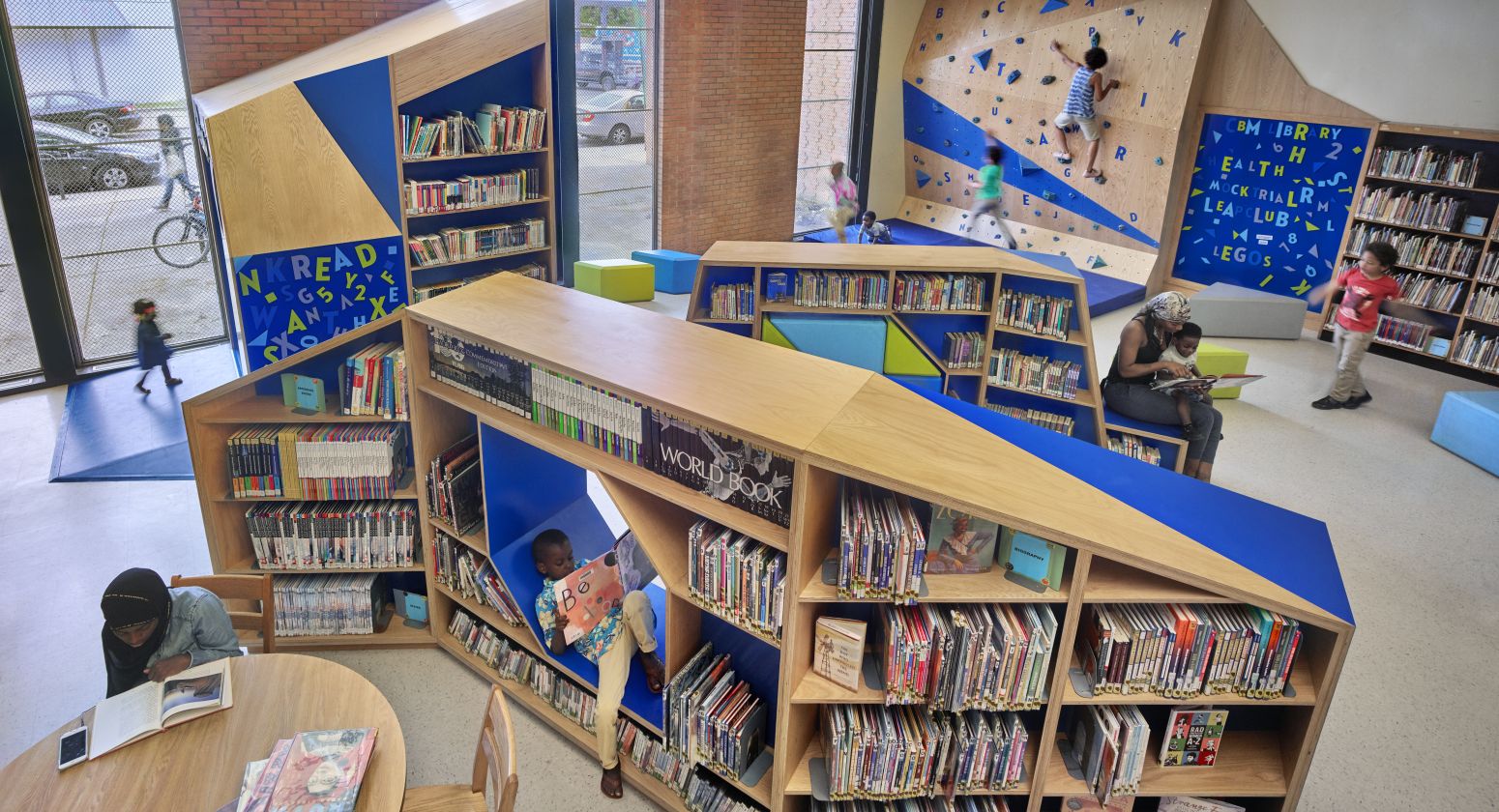
Making sure children have access to high-quality learning opportunities through their schools and early childhood education programs is central to our Great Learning program. But children only spend about 20% of their waking time in a traditional classroom setting. Consider the potential for fun, engaging learning opportunities during grocery store visits with a caregiver, at playtime in the park, in an after-school program, or waiting to board the bus or subway. How we design these spaces and use out-of-school time has proven potential to impact children’s early learning.
Our Literacy-Rich Environments funding helps create opportunities for families and out-of-school time staff to support children’s early learning anywhere children are. The science of playful learning – how children learn through guided play experiences – is central to our approach.
Philadelphia is a hub for playful learning research and implementation, with more than a dozen new installations and programs designed to infuse playful learning into the everyday experiences shared by children and families. The Temple University Infant & Child Laboratory and the Playful Learning Landscapes Action Network (PLLAN) are key leaders of this work and have brought together many partners to build support for playful learning across Philadelphia. In 2021, in recognition of the local momentum, Philadelphia was invited to participate in The Brookings Institution’s Playful Learning Landscapes City Network, joining Pittsburgh, Tel Aviv, and Chicago in a peer learning network for city-level decisionmakers and stakeholders to integrate evidence-based playful learning into their city’s practices and policies. The network has recently expanded to include Santa Ana, California and Lima, Peru.
Since 2015, William Penn Foundation has supported efforts to implement, expand, research, and evaluate playful learning in Philadelphia and spark broader use of this approach by local organizations and government. In that time, playful learning has seen strong momentum in three key areas:
- Proof of concept: What started as a strong research-based hypothesis that playful learning in public spaces would support adult-child interactions and increase child literacy and language development is today backed by the results of multiple evaluations of Philadelphia-based playful learning pilot projects as well as others from around the country.
- Partnerships: Many organizations have taken up this work and have created partnerships with one another to maximize impact. Collective efforts in which multiple organizations work together, such as the Informal Learning Initiative, help build staff knowledge and skills, and leverage expertise and resources so that all can serve children and families more effectively.
- Community engagement: Our partners in this work understand and have shown that community engagement is both the means and the end. A playful learning installation should reflect the surrounding community’s culture, values, and needs. This gives it a greater chance of becoming a beloved space where people gather and want to spend time, thus leading to the adult-child interactions that increase child literacy and language development.
Check out our Theory of Change to learn more about how and why we support this work.
Learn more about some of the exciting playful learning projects in Philadelphia below!
Tookany/Tacony-Frankford Watershed Partnership (TTF), in collaboration with Habitheque, designed and created a series of hands-on installations for young children and their caregivers to learn about science and nature in their community park, while building children's language and literacy skills. Six animal sculptures are the basis of the River Alive Learning Trail along Cayuga Street in the Juniata Park neighborhood. This unique activation is based on the River Alive exhibit at the Independence Seaport Museum. The bilingual (Spanish and English) Learning Trail provides an interactive, playful way for families to enjoy green space together while engaging with and learning about the natural environment around them in Tacony Creek Park. Six benches and sculptures, and two crosswalk murals were created and installed in collaboration with community members, Habithèque Inc., Youth Volunteer Corps of Philadelphia, and local artists Miguel Horn and Jay Coreano. TTF provides science and reading programs for neighbors inspired by this installation.
Mighty Engine, a Philadelphia-based creative agency, worked with SEPTA, the region’s public transportation authority, and Read By 4th, the citywide early literacy campaign, to transform public transit commutes into fun learning experiences to grow strong readers. From April to July 2022, the campaign known as "Come Aboard the Reading Promise" takes over two subway stations on SEPTA’s Broad Street Line and spans 70 bus shelters, three dozen buses, two subway cars and hundreds of signs across the city. PLLAN provided guidance to ensure the principles of playful learning are incorporated throughout the materials.
The campaign is designed for family enjoyment through repeated visits at no additional cost, unlocking the potential of high-traffic public spaces for learning. In addition to the engaging signage, a Short Édition short story dispenser is featured at each of the two subway stations. Families can select and print short stories on-demand at no charge to read together during their travels. The campaign welcomes story submissions from children and families.
This effort leverages the citywide network of over 500 Reading Captains volunteering to help families grow strong readers one conversation at a time. They will serve as the main distributors of campaign “Busy Bus Bags” full of reading materials, including a word journal specially designed for this adventure, to families while waiting at shelters and riding on buses.
Read more here.
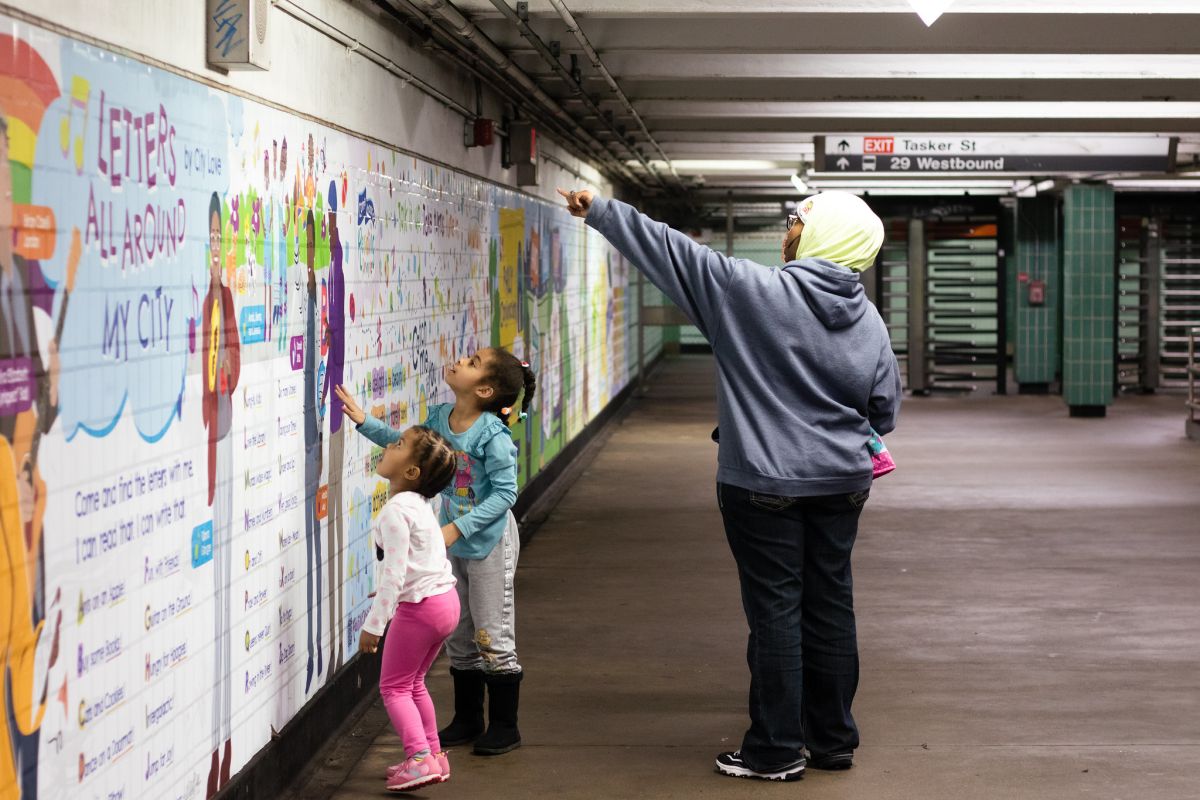
Photo courtesy of Read By 4th
Too Small to Fail, an initiative of the Clinton Foundation, is piloting “Family Read, Play & Learn Spaces” in Philadelphia laundromats. The first location opened in 2022. These informal learning environments feature equipment that engages children and families in opportunities for literacy and language development while they wait. Philadelphia’s Reading Captains – volunteers from the local community who champion early literacy and coordinate with the Read By 4th campaign – will spend time at the laundromats to engage families in read alouds and demonstrate how to use the new materials in the spaces to support children’s learning and development.
Too Small to Fail is also creating literacy-rich, child-friendly environments in waiting areas of city agencies that are frequently visited by families – a health clinic, social services agency, and homeless services provider. A training curriculum will support staff at each site to encourage early learning and adult-child interaction.
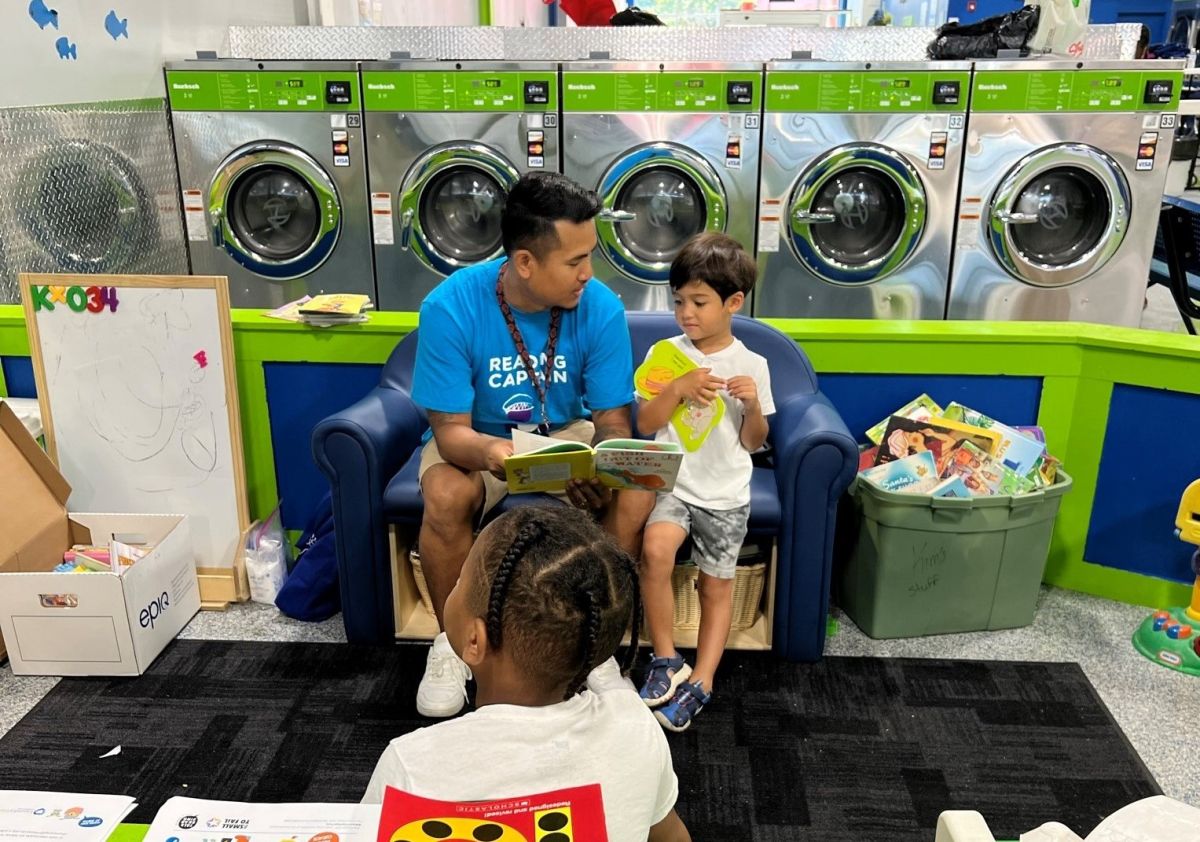
We Will Write the World encourages dialogue and interactions between adults and children through large-scale public art pieces. In the first phase of the project, four neighborhood teams of local artists, community-based organizations, and Reading Captains from Read By 4th worked with Mural Arts Philadelphia and creative agency Mighty Engine to develop billboards to promote early childhood literacy and adult-child reading interactions.
Community meetings provided a space for neighbors to consider the ways families can make Reading Promises to the children they love and help these children to become stronger readers. Using insights from community members, each billboard artist worked to creatively translate these promises into artwork that resonates within each neighborhood community.
Learn more and view the billboard artwork here.
Next, with the help of teaching artists, children are producing narratives for Storybook Murals so that each mural will reflect the neighborhood and its communities. As with the billboards, these art pieces will cue playful learning by advancing Reading Promises and tapping different learning styles and intelligences.
Billboard project teams:
Fairhill Billboard at Germantown Avenue & Glenwood Avenue
Artist: Keisha Whatley
Reading Captain: Ciara Vargas
Community Partner: Historic Fair Hill
Germantown Billboard at Germantown Avenue & Washington Lane
Artists: Faruq Adger, Faysal Adger, and Khaleel Adger
Reading Captains: Ms. Cherette and Gary King
Community Partner: Mt. Airy CDC
South Philadelphia Billboard at Washington Avenue & 9th Street
Artist: Manuela Guillén
Reading Captains: Carolotta Stafford and Erme Maula
Community Partner: South Philly Reading Captains
Logan Billboard at Broad Street & Belfield Avenue (pictured below)
Artist: Andre Chaney
Reading Captain: Dorian Harris
Community Partner: The Indochinese American Council
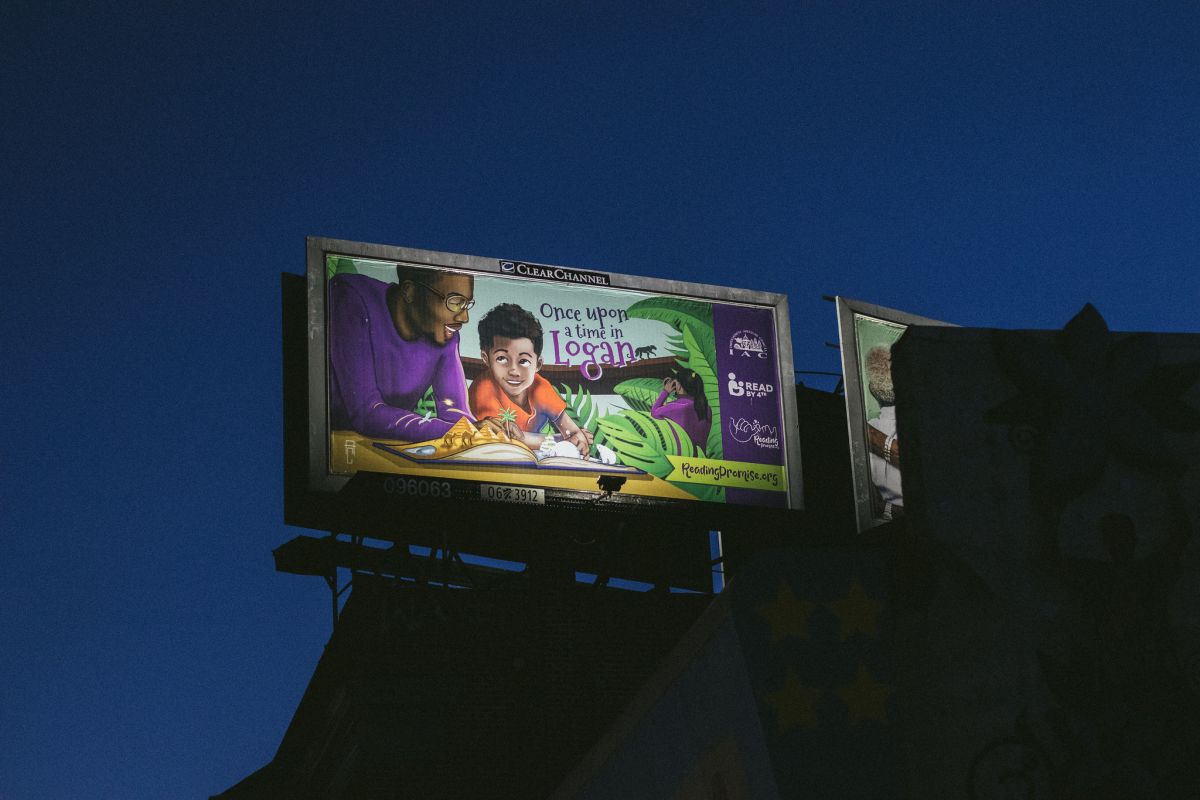
Photo courtesy of Read By 4th
The KABOOM! Play Everywhere Philly Competition supports child development and literacy skills by increasing access to playful learning installations in public spaces across the city. In 2020, $1 million was awarded to 16 unique project concepts designed to give Philadelphia children opportunities to learn through play and interaction with their caregiver, while out in the community together.
Each project is the result of a community-driven design process. Local groups submitted project ideas that were developed and refined with technical assistance from the Community Design Collaborative and PLLAN. An evaluation of the implementation and impacts is led by the Temple University Infant and Child Laboratory.
Read more about a few of the projects here and from WHYY.
As part of Play Everywhere Philly, Brewerytown Sharswood Neighborhood Coalition with Tiny WPA and Habitat for Humanity Philadelphia created a series of monuments to local heroes. Above, an installation at the Philly Peace Park honors astronaut Guion Bluford.
A multi-disciplinary team from Children’s Hospital of Philadelphia (CHOP) created Picture This!, a project using colorful, interactive murals to encourage fun and educational moments in primary care exam rooms – sparking conversations between adults and young children, building imagination, serving as an assessment tool for pediatricians, and elevating the overall patient/family experience. An initial pilot installation funded by the Foundation at three locations was expanded by CHOP in 2022 to include all CHOP Primary Care sites, more than 500 exam rooms.
The murals displayed on the walls in each exam room are designed to mimic large storybook pages, using the proven power of wordless picture books to foster creativity and conversation. And, if families want a little help to get started, each mural has an associated QR code leading to a website that guides families through the mural with a set of age-appropriate prompts, written by pediatric experts alongside parents and caregivers. These prompts include various question types, such as seek-and-find activities and story starters to get families talking.
The content incorporates social and language development milestones as well as relational concepts of bullying, safe street habits, sharing, and healthy relationships. To connect further with patients and families, the vibrant scenes also include CHOP and Philadelphia-centric illustrations – like a soft pretzel stand, City Hall, the Liberty Bell, community gardens, and a neighborhood playground.
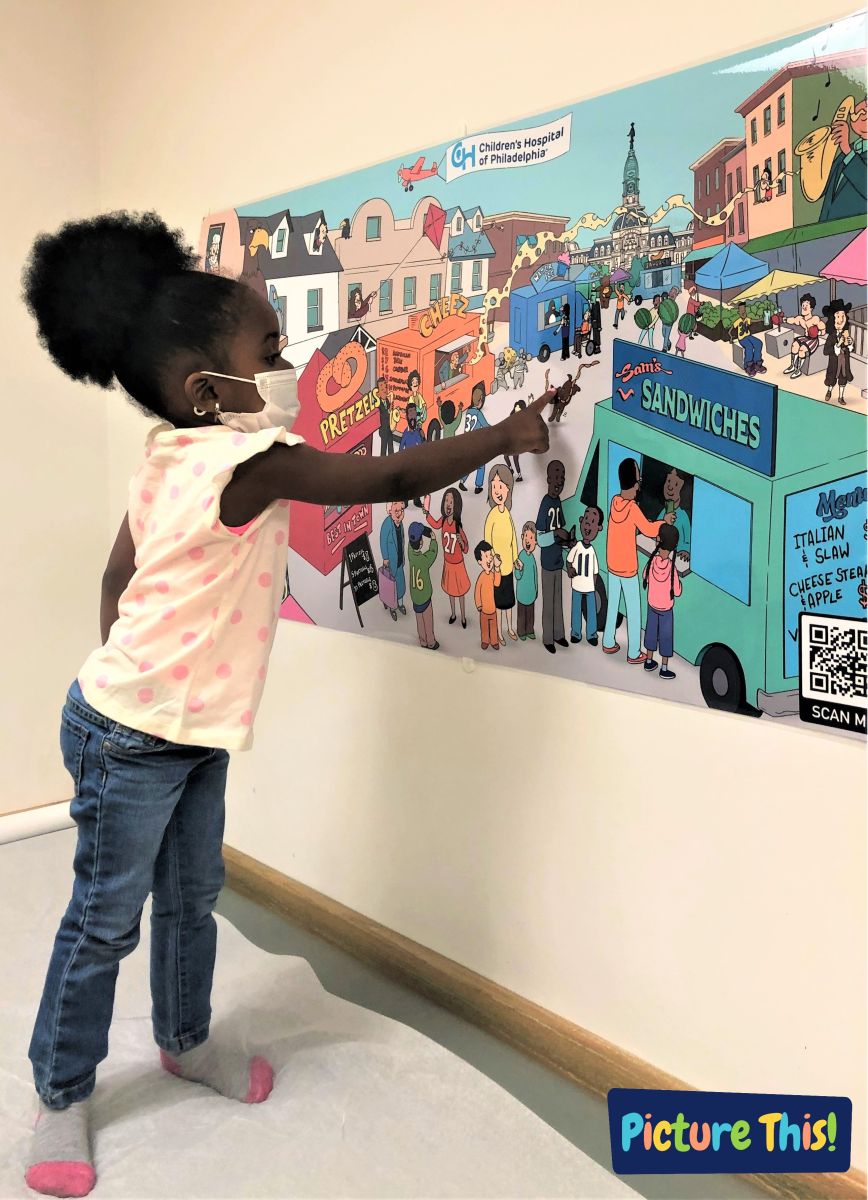
Philadelphia’s Playstreets program, more than 50 years old, closes neighborhood streets to traffic so children have a safe place to play and receive nutritious meals and snacks on summer days. In 2019, the City of Philadelphia Office of Children and Families collaborated with Philadelphia Parks & Recreation to pilot a play-based summer literacy program on ten Playstreets, led by groups including Fab Youth Philly, Philadelphia Police Athletic League, and the Free Library of Philadelphia. Thirty Playstreets now offer play-based literacy-programming to children, and several summer camps run by Parks & Recreation have begun to integrate the playful learning approach.
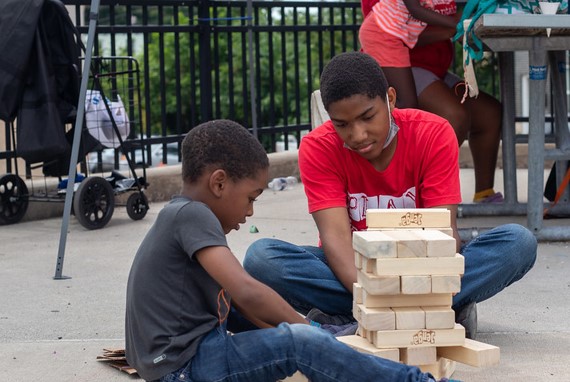
Photo courtesy of Read By 4th
In 2018, the Free Library of Philadelphia unveiled innovative play-and-learn spaces – unique among traditional U.S. libraries – at three neighborhood branches, transforming the children’s areas into dynamic learning landscapes that promote motor skills, language development, and early literacy.
With a climbing wall, perching tower, performance stage, nooks and tunnels, magnetic surfaces with large letter magnets, and reading alcoves inside shelving units, these spaces encourage both active play and quiet reading and reflection. With community input, the spaces were designed by architecture firm Digsau and Studio Ludo, a play-focused nonprofit, and outfitted with materials fabricated by Erector Sets, Inc.
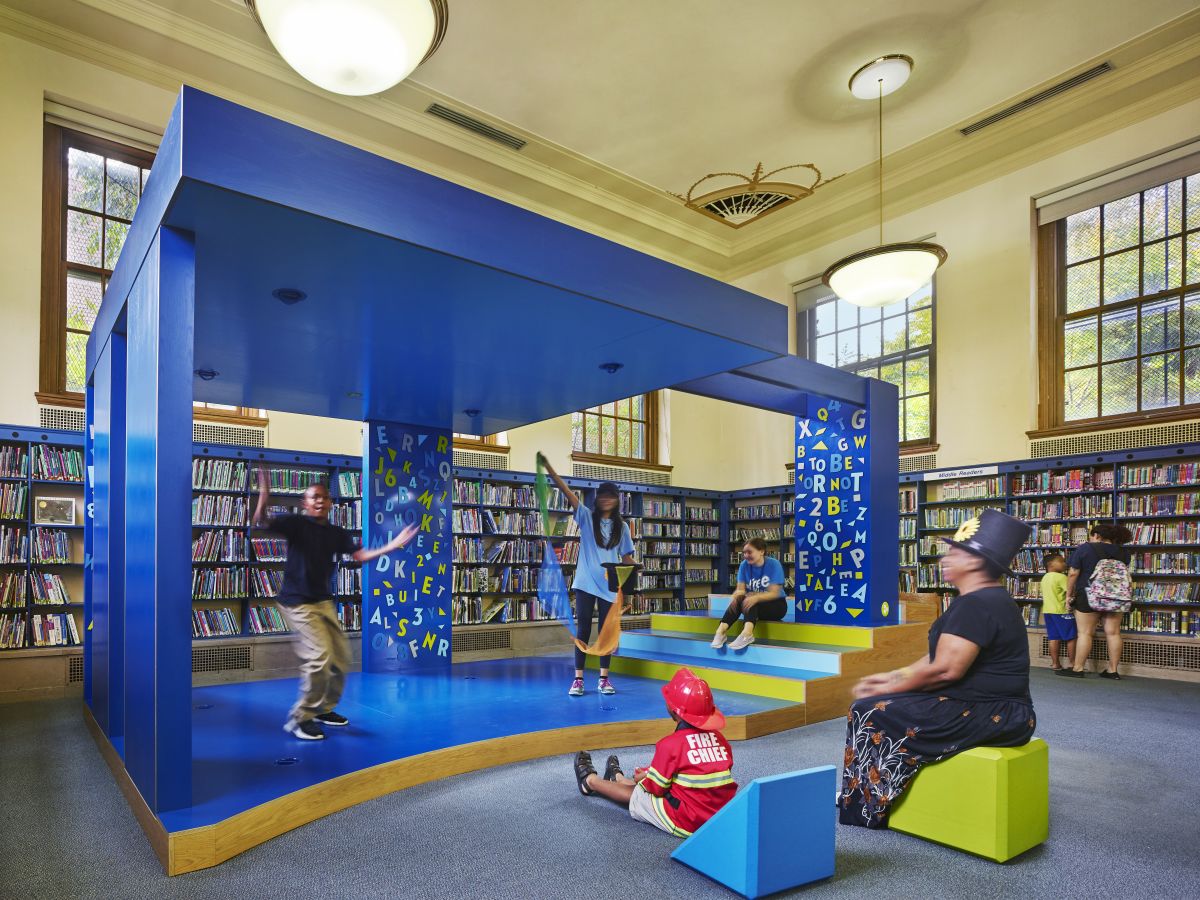
Photo by Todd Mason, Halkin Mason Photography
Urban Thinkscape features four playful learning installations at a busy bus stop in a West Philadelphia neighborhood. The project is a collaboration of the Belmont Alliance Civic Association-CDC, Temple University’s Infant and Child Laboratory, and architect Itai Palti. An evaluation shows that families at the bus stop interact with the games while talking about numbers and shapes – the type of adult-child interactions that build early literacy skills.
Learn more from The Brookings Institution and the Center on the Developing Child at Harvard University.
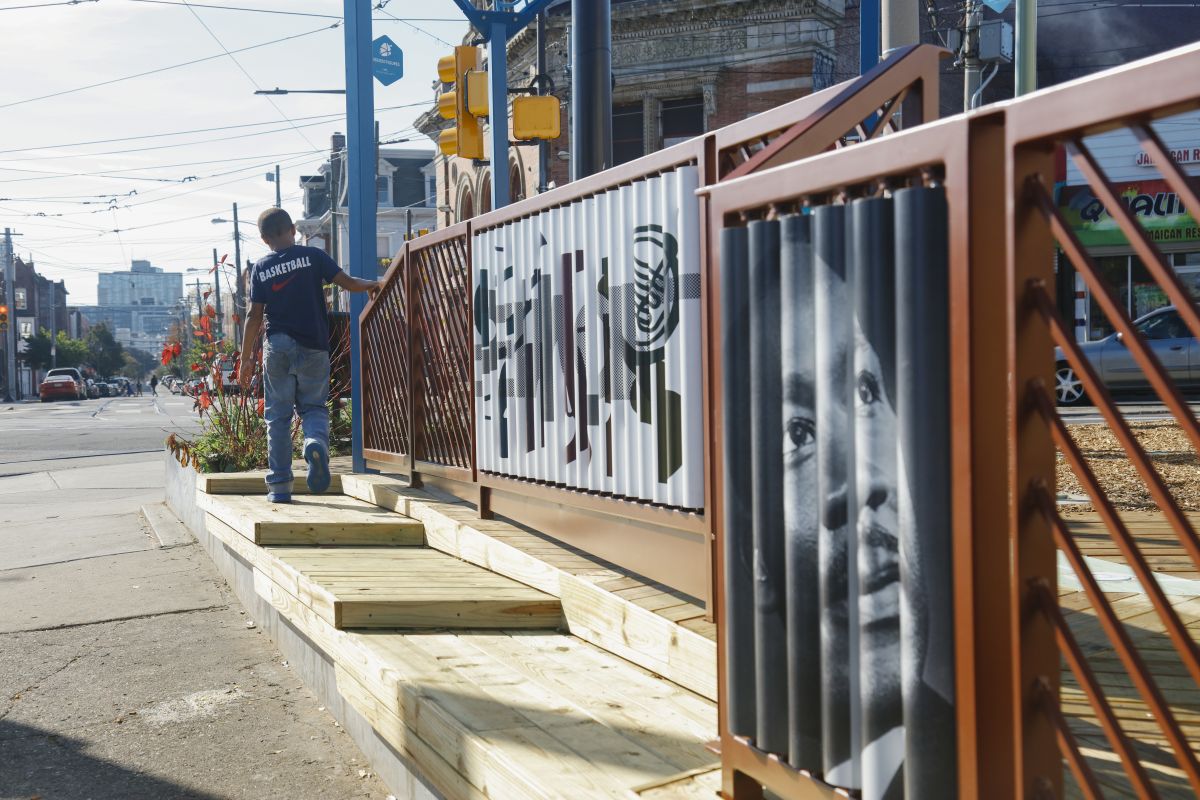
Photo by Sahar Coston-Hardy
The Literacy-Rich Neighborhoods Initiative builds on the learnings and successes of many of the individual playful learning projects described above. Four community-based organizations are working to create multiple opportunities for playful learning, literacy skill-building, and caregiver-child engagement within a specific neighborhood. A community engagement and planning process is underway in each of the neighborhoods to collect input on how early literacy activities should be designed and incorporated throughout their community.
The four community-based organizations and neighborhoods:
- Indochinese-American Council - Logan
- Mt. Airy Community Development Corporation - Germantown
- Puentes de Salud - South Philadelphia
- Village of Arts and Humanities - Fairhill
Organizations providing additional support, including technical assistance, coordination, design and scientific expertise, and evaluation:
- Community Design Collaborative
- Share Our Strength / Community Wealth Partners
- Temple University Infant and Child Lab/PLLAN
- Fred Rogers Center for Early Learning and Children's Media / Temple University / Harvard Graduate School of Education
Smith Memorial Playground and Read by 4th – Philadelphia’s grade-level reading campaign – partnered to create and install playful learning signage that encourages literacy-building interactions between caregivers and children in grocery stores, barber shops, and laundromats around the city. An early example of a playful learning installation supported by the William Penn Foundation, Talk It Up signage prompted high-quality caregiver-child interactions to increase children’s early language and literacy skills. This project contributed to the evidence base of playful learning and helped us to learn more about ways to attract families' attention in public places.
Read more from WHYY.
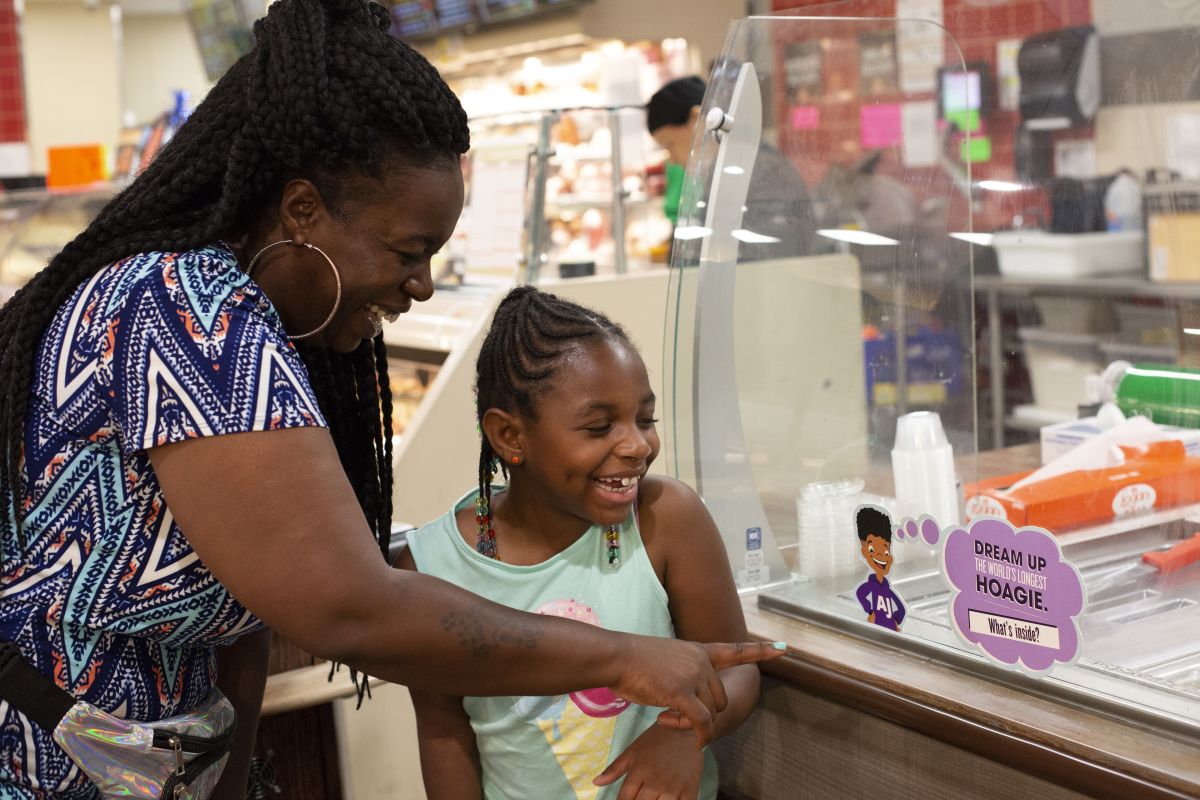
Progress Timeline















More Great Learning Stories
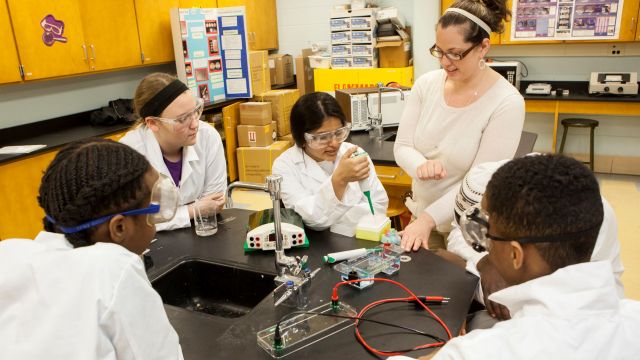
Supporting High School Students on the Path to Graduation
Learn More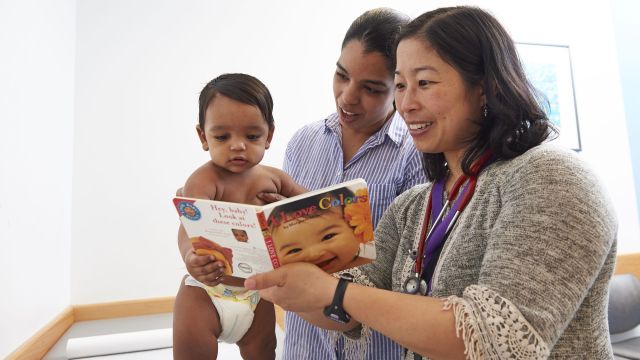
Engaging Families in Children’s Learning
Learn More